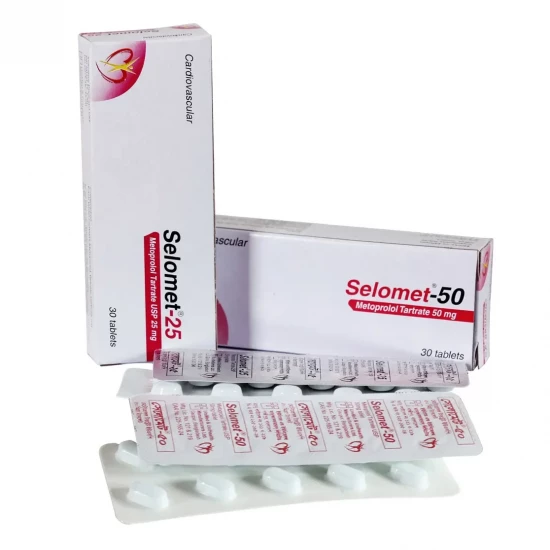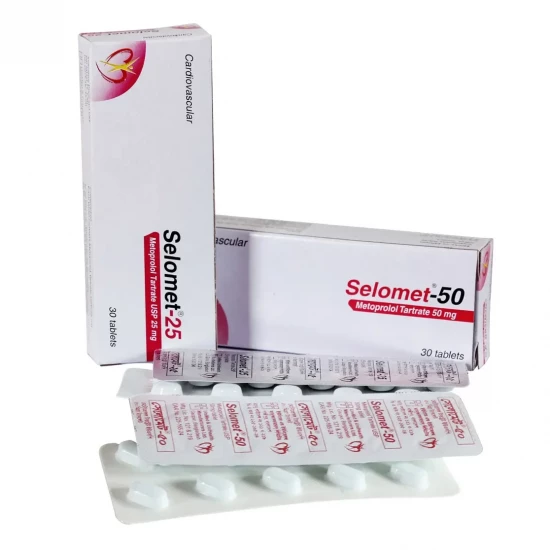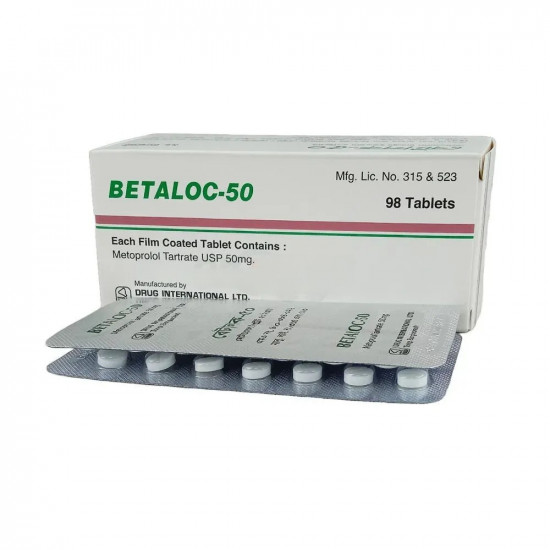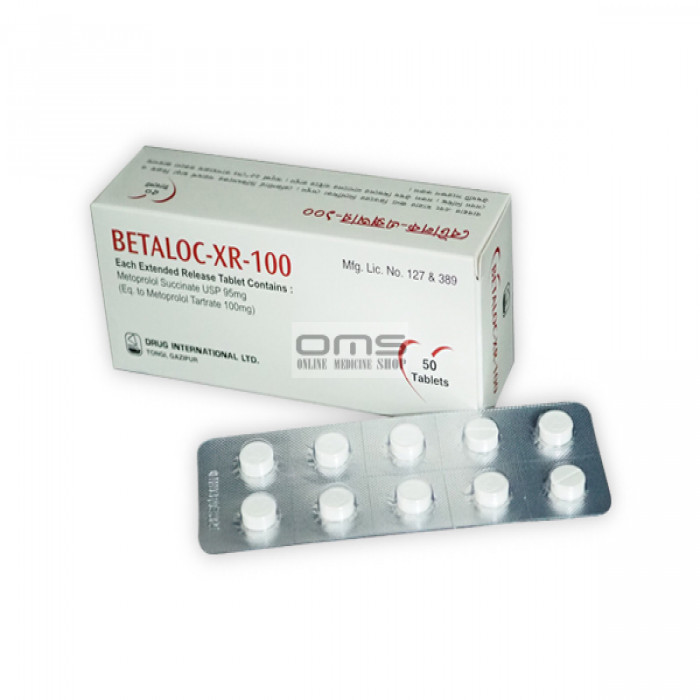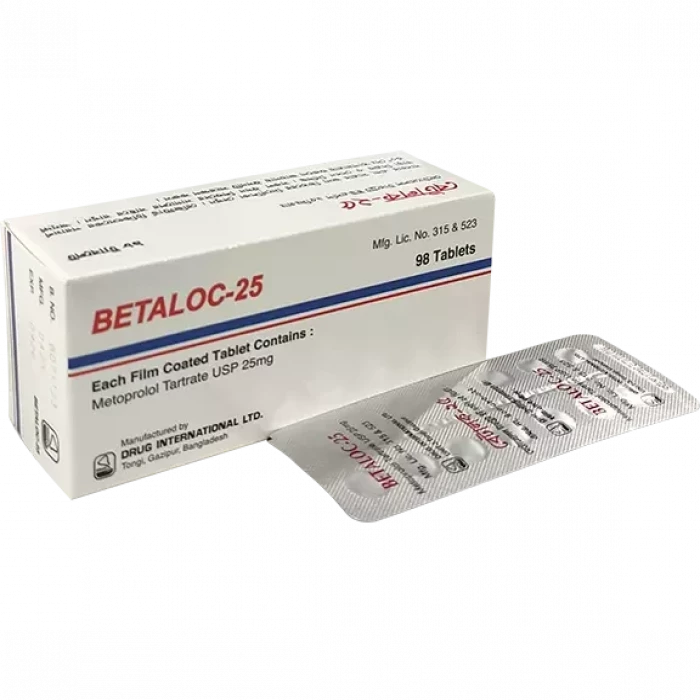
✔ 100% Authentic Product
👁️ Currently Viewing 3933
Betaloc 25mg Tablet 14pcs
Betaloc 25/Metoprolol Tartrate is used in the treatment of High blood pressure), Heart-related chest pain), Arrhythmia, heart attack, and Migraine.
Discount
Price: ৳ 21
MRP:
৳
21.7
5%
Off

100% Genuine Products, Guaranteed

Safe & Secure Payments, Always

Fast, Secure & Efficient Delivery

Proper Packaging
 Cash on Delivery - All over Bangladesh
Cash on Delivery - All over Bangladesh Regular Delivery - 12-24 Hours, Dhaka City* Charge Tk.39-59
Regular Delivery - 12-24 Hours, Dhaka City* Charge Tk.39-59 Regular Delivery - 24-48 Hours, Other Cities* Charge Tk.99-110
Regular Delivery - 24-48 Hours, Other Cities* Charge Tk.99-110
🌙 রমযান অফার 🌙
 ফ্রি ডেলিভারিঃ - ৭৯৯ টাকা+ অর্ডারে, ঢাকা
শহরে
ফ্রি ডেলিভারিঃ - ৭৯৯ টাকা+ অর্ডারে, ঢাকা
শহরে ফ্রি ডেলিভারিঃ - ২৭৯৯ টাকা+ অর্ডারে, ঢাকার
বাহিরে
ফ্রি ডেলিভারিঃ - ২৭৯৯ টাকা+ অর্ডারে, ঢাকার
বাহিরে
📲 মোবাইল অ্যাপ অর্ডারে সাশ্রয় বেশী
-
Google Play Store থেকে ডাউনলোড
-
Apple Store থেকে ডাউনলোড
100% Genuine Products, Guaranteed
Safe & Secure Payments, Always
Fast, Secure & Efficient Delivery
Proper Packaging
 Cash on Delivery - All over Bangladesh
Cash on Delivery - All over Bangladesh Regular Delivery - 12-24 Hours, Dhaka City* Charge Tk.39-59
Regular Delivery - 12-24 Hours, Dhaka City* Charge Tk.39-59 Regular Delivery - 24-48 Hours, Other Cities* Charge Tk.99-110
Regular Delivery - 24-48 Hours, Other Cities* Charge Tk.99-110 ফ্রি ডেলিভারিঃ - ৭৯৯ টাকা+ অর্ডারে, ঢাকা
শহরে
ফ্রি ডেলিভারিঃ - ৭৯৯ টাকা+ অর্ডারে, ঢাকা
শহরে ফ্রি ডেলিভারিঃ - ২৭৯৯ টাকা+ অর্ডারে, ঢাকার
বাহিরে
ফ্রি ডেলিভারিঃ - ২৭৯৯ টাকা+ অর্ডারে, ঢাকার
বাহিরে- Google Play Store থেকে ডাউনলোড
- Apple Store থেকে ডাউনলোড
🌙 রমযান অফার 🌙
📲 মোবাইল অ্যাপ অর্ডারে সাশ্রয় বেশী
✅ Description:
Metoprolol Tartrate is an antihypertensive medication used alone or with other drugs to treat high blood pressure (hypertension), symptoms of an overactive thyroid, angina (heart-related chest pain), arrhythmia (heart rhythm disorder), and to relieve migraine-related headaches.
Metoprolol Tartrate relaxes blood vessels by blocking the action of certain natural substances in the body. It slows down the heart rate, making it easier for the heart to pump blood, which lowers blood pressure and reduces the risk of stroke, heart attack, and other heart or kidney problems.
Take Metoprolol Tartrate as prescribed by your doctor. It needs to be taken regularly to be effective. Do not stop taking it without consulting your doctor, as abrupt cessation may cause heart rhythm changes, chest pain, or a heart attack. Your doctor will advise how to gradually reduce the dose if necessary.
Common side effects include tiredness, dizziness, stomach pain, nightmares, irregular heart rate, and skin rash. These typically do not require medical attention and resolve over time. If they persist, consult your doctor.
- Do not use Metoprolol Tartrate if you have heart rhythm problems, diabetes, kidney disease, or COPD.
- Avoid driving or operating heavy machinery as it may cause dizziness and drowsiness.
- Orthostatic hypotension (sudden drop in blood pressure when standing) may occur, so stand up slowly.
- Inform your doctor if you are having surgery or require anesthesia.
Safety Advices

Alcohol
UNSAFE
Drinking alcohol may increase tiredness, and lower blood pressure causing dizziness or drowsiness. So avoid its intake with Betaloc 25mg Tablet.

Pregnancy
CONSULT YOUR DOCTOR
Betaloc 25mg Tablet is not recommended during pregnancy unless your doctor considers it essential. Your doctor will weigh the benefits and any potential risks before prescribing it to you.

Breastfeeding
CONSULT YOUR DOCTOR
Betaloc 25mg Tablet is not recommended if you are a breast-feeding woman unless your doctor considers it essential. Your doctor will weigh the benefits and any potential risks before prescribing it to you

Driving
CAUTION
You may experience dizziness, tiredness, or blurred vision while taking Betaloc 25mg Tablet. So, it is not recommended to drive, use machinery, or perform other tasks.

Kidney
CONSULT YOUR DOCTOR
Betaloc 25mg Tablet is not recommended in patients with liver disease or failure. Your doctor may prescribe Betaloc 25mg Tablet depending on your condition.

Liver
CONSULT YOUR DOCTOR
Betaloc 25mg Tablet is not recommended in patients with kidney disease or failure. Your doctor may prescribe Betaloc 25mg Tablet depending on your condition.
✔️ Uses of Betaloc 25mg Tablet
- Hypertension (high blood pressure)
- Angina (heart-related chest pain)
- Arrhythmia
✔️ How does Betaloc 25mg Tablet work?
Betaloc 25 is a short-acting beta blocker that works specifically on the heart. It works by slowing down the heart rate and makes the heart more efficient at pumping blood around the body.
✔️ Overdose Effects of Betaloc 25mg Tablet
An overdose of metoprolol may result in severe hypotension, sinus bradycardia, AV block, heart failure, cardiogenic shock, cardiac arrest, bronchospasm, impairment of consciousness, coma, nausea, vomiting, cyanosis, hypoglycemia, and occasionally hyperkalemia. Symptoms usually appear within 20 minutes to 2 hours of ingestion. Treatment includes monitoring cardiovascular, respiratory, and renal function, as well as blood glucose and electrolytes. Prevent further absorption through vomiting, gastric lavage, or activated charcoal if recent. Symptomatic treatment may require sympathomimetic agents (e.g., noradrenaline, metaraminol), atropine, or inotropic agents (e.g., dopamine, dobutamine). Temporary pacing may be needed for AV block. Glucagon can reverse excessive beta-blockade effects. Intravenous beta2-stimulants (e.g., terbutaline) may relieve bronchospasm. Hemodialysis is not effective.
✔️ Side Effects of Betaloc 25mg Tablet
Common side effects include tiredness, dizziness, depression, diarrhea, itching or rash, shortness of breath, slow heart rate, mental confusion, headache, somnolence, nightmares, insomnia, dyspnea, nausea, dry mouth, gastric pain, constipation, flatulence, digestive tract disorders, heartburn, pruritus, musculoskeletal pain, blurred vision, decreased libido, and tinnitus. AV block intensification has also been reported.
✔️ Quick Suggestions:
✔️ Indication of Betaloc 25mg Tablet
Betaloc 25mg Tablet is indicated for the management of hypertension and angina pectoris, treatment of cardiac arrhythmias, especially supraventricular tachyarrhythmias, and as an adjunct in hyperthyroidism treatment. Early intervention with Betaloc in acute myocardial infarction reduces infarct size and the incidence of ventricular fibrillation. It can also provide pain relief, reducing the need for opiate analgesics. Betaloc has demonstrated a reduction in mortality in patients with acute myocardial infarction.
✔️ Pharmacology
Metoprolol is a selective beta1-blocker. It diminishes the agonistic effects of catecholamines on the heart, which are released during physical and mental stress. As a result, Metoprolol reduces the usual increase in heart rate, cardiac output, cardiac contractility, and blood pressure that catecholamines cause. Compared to non-selective beta-blockers, Metoprolol has less impact on insulin release and carbohydrate metabolism and interferes less with the cardiovascular response to hypoglycemia.
✔️ Dosage & Administration of Betaloc 25mg Tablet
Film-coated tablet:
- Hypertension: The total daily dosage of Metoprolol is 100-400 mg, given as a single dose or twice daily. The starting dose is 100 mg per day, increased by 100 mg per day at weekly intervals. If full control is not achieved with a single daily dose, a twice-daily regimen should be initiated. Combination therapy with diuretics or other antihypertensive agents may also be considered.
- Angina: Usually 50 mg to 100 mg, taken two to three times daily.
- Cardiac arrhythmias: Typically, 50 mg is taken twice or three times daily, which can be increased up to 300 mg per day in divided doses if necessary. Post-acute arrhythmia treatment with Metoprolol injection should be followed by Metoprolol tablets 4-6 hours later, with an initial oral dose not exceeding 50 mg thrice daily.
- Hyperthyroidism: 50 mg four times a day, with dosage reduced as the euthyroid state is achieved.
- Myocardial infarction: Therapy should start 15 minutes after the last injection with 50 mg every 6 hours for 48 hours. For those who cannot tolerate the full intravenous dose, half the oral dose is recommended. Maintenance typically involves 200 mg daily in divided doses. No special dosage requirements for healthy elderly patients, but a dose reduction may be necessary for significant hepatic dysfunction.
- Hepatic Impairment: Use with caution in patients with liver dysfunction.
- Pediatric Use: No significant differences in adverse events between pediatric (aged 6-16) and adult patients. Safety and effectiveness are not established for children under 6.
- Geriatric Use: No notable differences in efficacy or adverse events between older and younger patients.
✔️ Interaction
Catecholamine-depleting drugs (e.g., Reserpine, Monoamine Oxidase (MAO) inhibitors) may enhance the effects of beta-blockers. Drugs inhibiting CYP2D6 (e.g., quinidine, fluoxetine, paroxetine, propafenone) can increase Betaloc concentration, decreasing its cardioselectivity. Concomitant use of digitalis glycosides and beta-blockers raises the risk of bradycardia. Beta-blockers may exacerbate rebound hypertension following the withdrawal of clonidine.
✔️ Contraindications
Betaloc is contraindicated in AV block, uncontrolled heart failure, severe bradycardia, sick sinus syndrome, cardiogenic shock, severe peripheral arterial disease, known hypersensitivity to Metoprolol or other beta-blockers, and in myocardial infarction complicated by significant bradycardia, first-degree heart block, systolic hypotension (<100mmHg), and/or severe heart failure.
✔️ Pregnancy & Lactation
Pregnancy: Category C. Use during pregnancy only if clearly needed.
Lactation: Metoprolol is excreted in small quantities in breast milk. Caution is advised when administered to nursing women.
✔️ Precautions & Warnings
- Bronchospastic Diseases: Use with caution in patients with bronchospastic disease unresponsive to or intolerant of other antihypertensive treatments.
- Major Surgery: The necessity of withdrawing beta-blockers before major surgery is controversial, as they may increase the risks of general anesthesia and surgical procedures.
- Diabetes and Hypoglycemia: Beta-blockers may mask tachycardia associated with hypoglycemia, but other symptoms like dizziness and sweating may persist.
- Peripheral Vascular Disease: Beta-blockers can worsen symptoms of arterial insufficiency in patients with peripheral vascular disease.
- Calcium Channel Blockers: Use caution in patients treated concurrently with these agents due to significant inotropic and chronotropic effects.
✔️ Storage Conditions:
Store in a cool, dry place, protected from light.
⚠️Disclaimer:
At ePharma, we’re committed to providing accurate and accessible health information. However, all content is intended for informational purposes only and should not replace medical advice from a qualified physician. Please consult your healthcare provider for personalized guidance. We aim to support, not substitute, the doctor-patient relationship.




